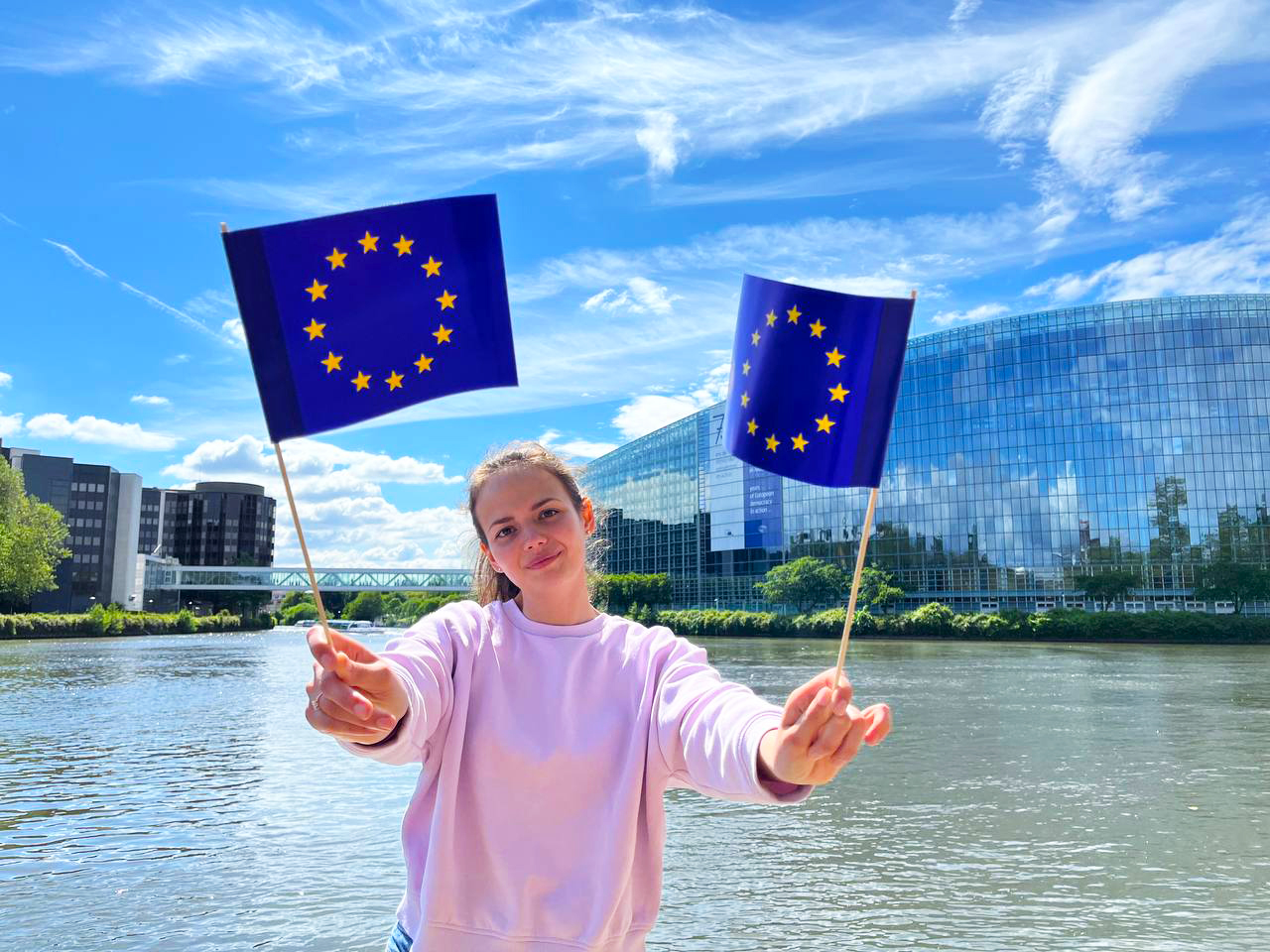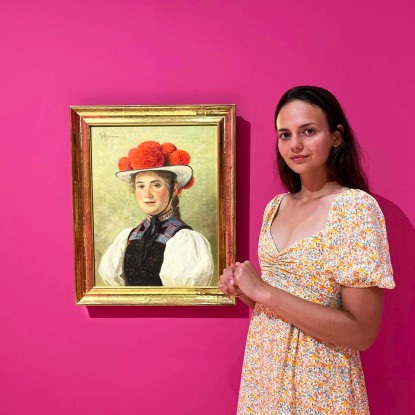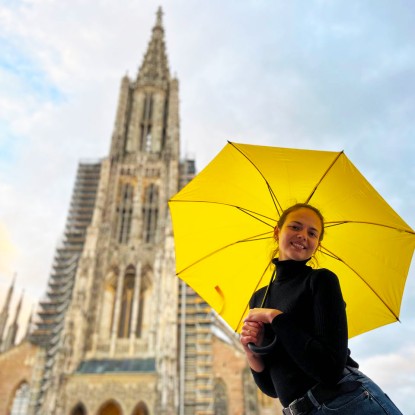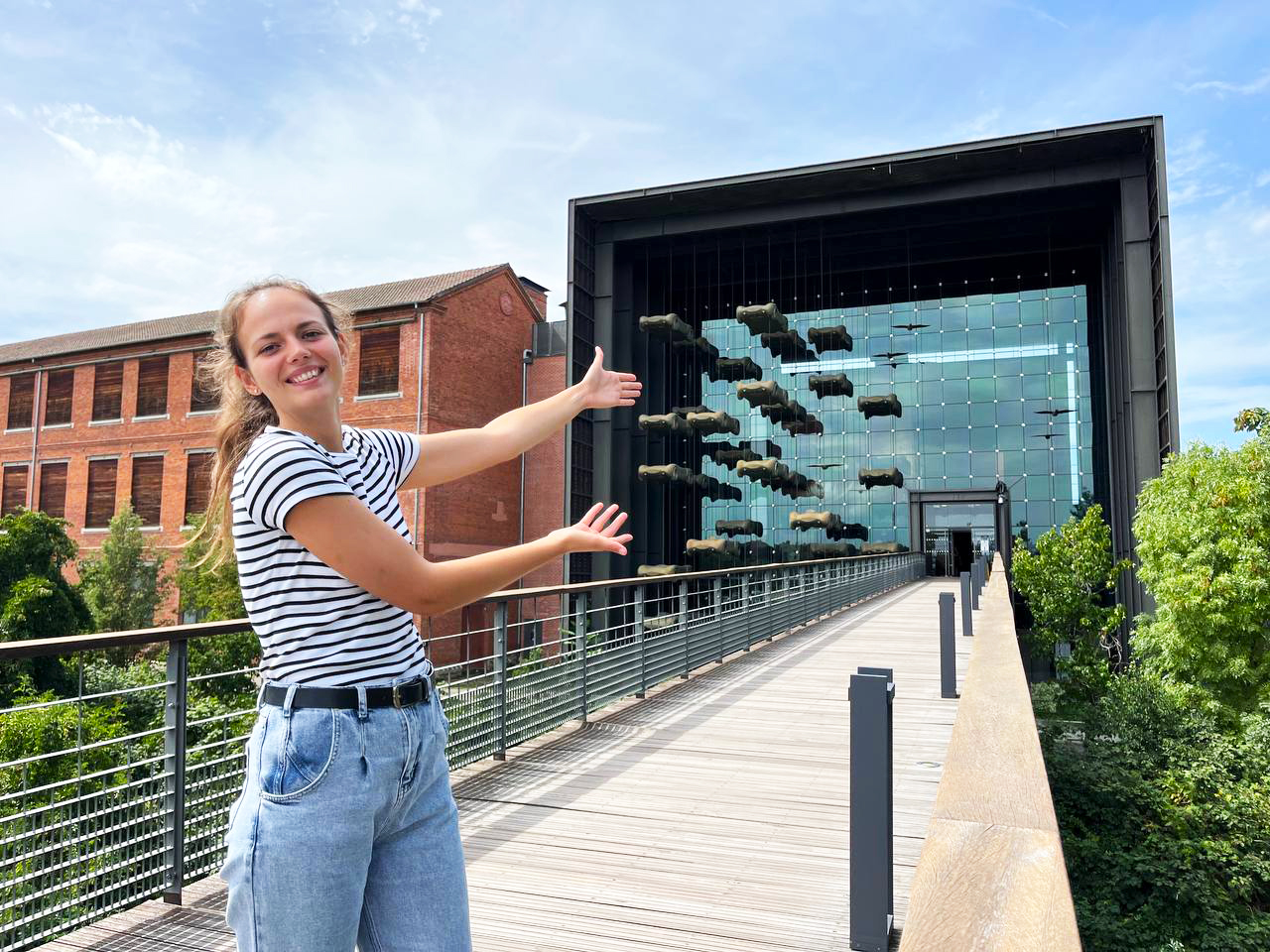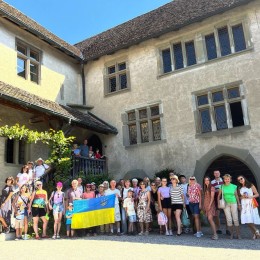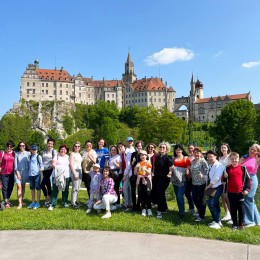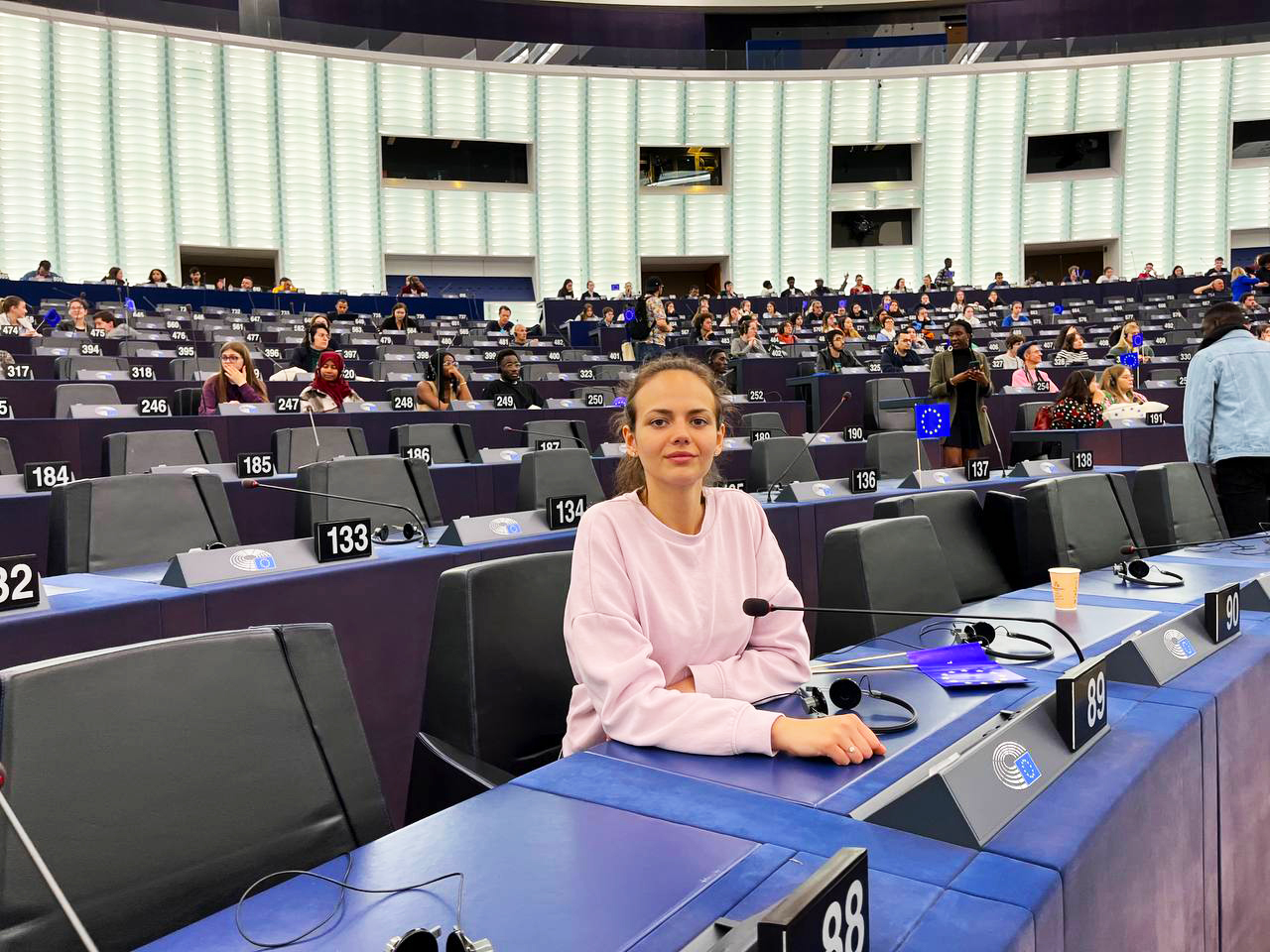How a refugee from Mykolaiv overcomes the difficulties of EU integration through culture: «History and traditions help to understand the mentality»
- Alisa Melik-Adamian
-
•
-
16:00, 28 November, 2023
Since the beginning of February 24, 2022, Germany has accepted more than a million Ukrainians who left their home due to Russian aggression. During these almost two years, they got used to a new environment and cultural environment. Sometimes rapprochement with the country is given to a person so organically that his experience serves as an example for hundreds of other people, as a tool for integration. Dariia Manzaruk, a forced emigrant from Mykolaiv, is one of those who today helps Ukrainians to better familiarize themselves with German culture.
NikVesti tells the story of a girl who has been developing cultural integration routes for more than a year and organizing joint trips to the country's historical monuments.
Dariia Manzaruk is a former Mykolaiv official. Before the war, she did not engage in public activities and rarely traveled even in her native Ukraine. Today, the girl heads the public organization «Ukrainer ist dabei» in Germany and runs a Telegram channel in which she talks about her own experience of studying the culture, history and traditions of the German people.
«I am a refugee, like millions of Ukrainians around the world, so I understand well how difficult it is to start over in a new country. To learn a new language, not to lose your profession, your dreams and fully integrate into a new society. In fact, studying the culture of Germany became my salvation. It was actually my first trip abroad, even my trips from Mykolaiv can be counted on the fingers of one hand. When I came to Germany, I started visiting museums, monuments of history and culture, simultaneously describing all this in my social networks. As a result, in six months in Germany, I have already organized 37 educational trips to the state of Baden-Württemberg for more than 300 Ukrainian refugees,» says Daria.
Everyone's cultures are very different, but equally interesting
Life in Germany for a migrant from Mykolaiv is not just a search for oneself in a new environment, but also a large layer of work to facilitate the integration process for other Ukrainians.
«Culture accelerates the processes of integration in a new society. Understanding history and traditions helps you understand local people, their mentality and behavior. If you hear someone say clichés about a nation or region, the person clearly has no deeper interest than Tik Tok hashtags. Everyone is very different, but equally interesting,» says the girl.
But it is not easy and simple in such a job, says the girl. The difficulty lies in the language barrier, lack of tour guides, translation of information and high prices for visiting cultural monuments.
«Of course, starting something new in another country, the language of which you do not know and have never studied, is scary. Do you think, without language, without experience in logistics, organization, laws, without money and acquaintances who can help, without relatives and support, it can be organized without problems? Unfortunately no. But I still managed to implement my idea. I now think about how I managed to do it, and I don't understand myself,» she jokes.
Dasha's main mechanism in helping Ukrainians integrate is travel and expeditions. At first it was a visit to museums and monuments architecture, and then grew into full-fledged routes through the land of Baden-Württemberg.
«I started my own Telegram channel, started to write, plan, draw up routes theoretically, writing history and interesting facts in the channel, discussing it with other refugees. One day we agreed on a joint trip to Hohenzollern Castle in the city of Sigmaringen. More than 20 people gathered then. Later, I suggested in my Telegram channel to visit the art museum in the city of Basel, and you can't imagine my surprise when at the station I counted 86 people who came to the museum with me! Since then, I keep a record of my travels, and cover the same route 3-4 times to satisfy the needs of all comers.
The routes, by the way, are very affordable in terms of transport, especially after the appearance of a ticket for 49 euros. In general, it is quite easy and convenient to get anywhere in Germany by public transport. Everything is very simple when there is such a huge infrastructure and availability of information. If in our country it is sometimes a whole quest to get to the monuments of history and culture, in Germany all logistical, infrastructural, and information issues have been solved and brought to perfection. My merit is probably only that I am a kind of logistical nerd who carefully plans, proofreads, translates and organizes everything,» the girl shares.
The Ukrainian community in Europe is growing, and someone has to help in learning a new culture
At the end of October, on her Instagram account, Dariia said that she decided to register the public organization «Ukrainer ist dabei» for more effective development. More information about the NGO's activities can be found on the organization's website ua-dabei.com.
The girl invited everyone who wants to work on the integration of Ukrainians into European society to cooperate.
— Our community pushed me to this decision. As part of our expeditions and training, we need to rent buses, use the services of translators, book tickets, write letters to cultural centers, state institutions and local self-government bodies. And considering the fact that I have the right to register a public organization in Germany, why not take advantage of the opportunities for the development and organization of our Ukrainian community.
The local government also responded positively to Dasha's initiative to organize and hold tourist events.
«I must give credit to the Germans: I have not met more comfortable, open, sincere and pleasant people. I was especially surprised by the officials, they supported and helped my initiative, I am very grateful to everyone,» shared Daria.
When you no longer have a home, integration becomes a necessity
During the full-scale war in Ukraine, the front-line regions became one of the regions most affected by Russian aggression. Most of the people there have lost everything and are starting life over in other cities of Ukraine or Europe. The most difficult thing when working with such people is understanding what they have experienced and how they are now recovering from it.
«I met refugees from different parts of Ukraine, there were even people from my native Mykolaiv, but most of the refugees were from Mariupol, Kherson and Kharkiv regions. It's scary when people start life from scratch for the first time. Initially fleeing the war from Donetsk and Luhansk regions to other regions of Ukraine. Now they are again forced to seek refuge in Europe,» she says.
The objects of travel are mostly museums, castles, cathedrals, monuments of history and culture. Talking about what her favorites are, Dasha mentions:
«Ulm Cathedral is the tallest church in the world, its spire reaches a height of 161.53 meters. The Rhine Falls is perhaps the most amazing natural sight, the Augustinian Museum in Freiburg, the Art Museum in Basel, the medieval part of Colmar and the Vogtsbauernhof, an open-air museum that reveals the culture of the Black Forest. And in general, there are a lot of such sights, and they are all unusually beautiful, so it is difficult to say about something specific. In addition to architecture, there are also traditional holidays, festivals, nature, infrastructure,» she adds.
During the period of organizing tourist expeditions, the girl has already formed a top of useful rules that can facilitate her stay in an unfamiliar country, and in particular, in Germany:
-
language improvement;
-
recognition of professional qualifications — we should not put a cross on our profession while building a new life in Germany, it is necessary to deal with the recognition of professional qualifications for the professional future;
-
social activity - join local events based on your interests, this will help you learn the language, find acquaintances and useful information;
-
creating a positive image of a Ukrainian;
-
preserving Ukrainian identity and supporting Ukraine;
-
studying German culture is what I do, but locally in my district of Freiburg, Baden-Württemberg.
Dariia Manzaruk notes that integration can also have a positive effect on the fact that when the majority of Ukrainians will be able to return home, it will be easier for them to implement European principles in their lives.
«And most importantly, what is important to me, whether Ukrainians will stay in Europe or return to Ukraine, I try to ensure that the current approach to life and culture is reflected in their everyday life: from sorting garbage to protecting human rights,» Dasha shares.
Dariia Manzaruk sees the peculiarity of her travels and itineraries in the awareness of European values, because she heard about European integration both at school and at the university, but she was able to really understand this influence on herself only when she was in Germany.
«Now I'm ready to do everything so that European values are not only in books and slogans on TV in Ukraine,» the girl summed up.
Dariia Manzaruk, a girl from Mykolaiv, is an example of how one person can make a big contribution to the integration of hundreds of people into a new culture. Her work today is a challenge, first of all, to herself in the opportunity to help and support those who are forced to seek a better life in a new environment, broadcasting goodness and faith in the fact that every person is able to start over.
Alisa Melik-Adamian, NikVesti
